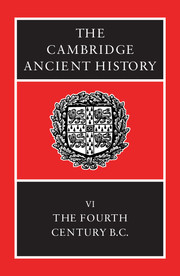Book contents
- Frontmatter
- 1 Sources and their uses
- 2 Sparta as victor
- 3 Persia
- 4 The Corinthian War
- 5 Sicily, 413–368 B.C.
- 6 The King's Peace and the Second Athenian Confederacy
- 7 Thebes in the 360s B.C.
- 8 Regional surveys I: Persian lands and neighbours
- 9 Regional surveys II: the West and North
- 10 Society and economy
- 11 The polis and the alternatives
- 12 Greek culture and science
- 12a The Growth of Schools and the Advance of Knowledge
- 12b Medicine
- 12c Greek art: Classical to Hellenistic
- 12d Greek agriculture in the classical period
- 12e Warfare
- 13 Dion and Timoleon
- 14 Macedon and north-west Greece
- 15 Macedonian hegemony created
- 16 Alexander the Great Part 1: The events of the reign
- 17 Alexander the Great Part 2: Greece and the conquered territories
- 18 Epilogue
- Chronological Table
- BIBLIOGRAPHY
- Index
- Map 1: Greece and Western Asia Minor
- Map 9: Egypt
- Map 20: Alexanders campaigns
- References
12a - The Growth of Schools and the Advance of Knowledge
from 12 - Greek culture and science
Published online by Cambridge University Press: 28 March 2008
- Frontmatter
- 1 Sources and their uses
- 2 Sparta as victor
- 3 Persia
- 4 The Corinthian War
- 5 Sicily, 413–368 B.C.
- 6 The King's Peace and the Second Athenian Confederacy
- 7 Thebes in the 360s B.C.
- 8 Regional surveys I: Persian lands and neighbours
- 9 Regional surveys II: the West and North
- 10 Society and economy
- 11 The polis and the alternatives
- 12 Greek culture and science
- 12a The Growth of Schools and the Advance of Knowledge
- 12b Medicine
- 12c Greek art: Classical to Hellenistic
- 12d Greek agriculture in the classical period
- 12e Warfare
- 13 Dion and Timoleon
- 14 Macedon and north-west Greece
- 15 Macedonian hegemony created
- 16 Alexander the Great Part 1: The events of the reign
- 17 Alexander the Great Part 2: Greece and the conquered territories
- 18 Epilogue
- Chronological Table
- BIBLIOGRAPHY
- Index
- Map 1: Greece and Western Asia Minor
- Map 9: Egypt
- Map 20: Alexanders campaigns
- References
Summary
ANTECEDENTS
Higher education had come to Athens with the arrival of the sophists in the third and fourth quarters of the fifth century (CAH V 341–69), in order to meet the demands of a flourishing democracy for excellence in public speaking in Council, Assembly and the jury courts. Protagoras of Abdera, the earliest of these teachers to arrive in Athens, was the first to call himself a ‘sophist’, a term which came to be applied in a more or less loose way also to other teachers of rhetoric who appeared in Athens from abroad during the next two or three decades: Gorgias of Leontini, Prodicus of Ceos, Hippias of Elis, Thrasymachus of Chalcedon, Euthydemus and Dionysodorus of Chios, and a number of others. None of these men spent an extended period of time in Athens, and none had a fixed home there. In the course of their visits, they were entertained at the homes of prominent Athenians, would give public displays of their rhetorical skills, and accepted on an ad hoc basis any Athenian willing to pay a stated fee as their student. Any private home or public place (palaestra, gymnasium, or stoa) might serve as the locale of their instruction.
Unlike the ‘natural philosophers’ of Ionia and of southern Italy, they were not interested in the pursuit of knowledge for its own sake but in preparing their students for a happy and successful life. Young upper-class Athenians believed success to be attained through the art of persuasion, and rhetoric was what the sophists delivered.
- Type
- Chapter
- Information
- The Cambridge Ancient History , pp. 592 - 633Publisher: Cambridge University PressPrint publication year: 1994
References
- 18
- Cited by



